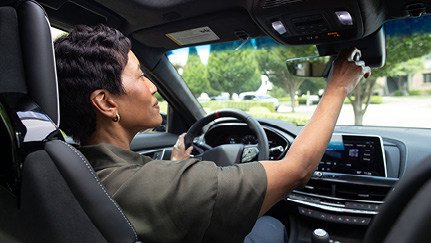Loading...
Hitting the road this summer? Be prepared.

With gas prices expected to remain relatively low and the current average price of unleaded gasoline at $2.37 per gallon,¹ you can expect another busy summer driving season. With this rise in traffic comes an increase in calls for roadside assistance. Insurance companies are busy preparing for a high number of roadside assistance dispatches for common vacation mishaps, such as a flat tire, dead car battery or keys locked inside the car. The most common calls for roadside assistance from our clients are: towing (54%), jump starts (23%) and flat tires (15%).²
Nationwide Private Client Risk Solutions recommends the following tips to be safe on the road.
Prepare for your road trip
- Take your vehicle to be inspected by a qualified mechanic several days before you depart.
- Make sure your vehicle is in good working order for your trip, including but not limited to tires, battery, belts, fluids and air conditioner.
- Ensure child car seats are properly installed and are size-appropriate.
- Get a good night’s sleep. Drive only when well rested, and make sure to stop every two hours or 200 miles to stay sharp.
- Pack an emergency kit, and include:
- Water
- Warm blankets
- Flashlight
- Jumper cables
- Flares or reflectors
- Tools to change a tire
- First-aid kit
- Fully charged cellular phone
Stay safe during a roadside emergency
- Take action immediately. Pull onto the shoulder and out of traffic as far as possible considering the conditions.
- Warn others you are having trouble. Use your hazard and warning flashers immediately. Raise the vehicle hood, if safe to do so, to alert passing authorities that the vehicle is disabled and help is needed.
- Call for roadside assistance. Nationwide Private Client policyholders with roadside assistance coverage can call our Solutions Center at 1-855-473-6410 and select option 1, then option 1 again, to be directly connected to our roadside assistance partner, Agero.³
- Wait for professional help to arrive. Don’t attempt to fix your vehicle unless you have training to do so. In 2016, the wait time for roadside assistance arrival was an average of 30 minutes or less.
- Don’t exit your car until it’s safe. Don’t exit the vehicle unless it is necessary and safe to do so — especially if you are on a busy road or highway. Don’t stand next to or behind the vehicle. Too often people survive car accidents only to be injured from a secondary accident because they have gotten out of their vehicle.
- Download our mobile app. With the Private Client Connect™ mobile app, help is at your fingertips. You can access roadside assistance benefits whether or not you are in an insured vehicle. This will give you added peace of mind, especially if you have children since the benefits follow the client, not the vehicle. Your children can get assistance even when traveling in a friend’s car.
About Agero, our roadside assistance partner:
With more than 40 years of experience, Agero is a leading provider of vehicle and driver safety, security and information services, including roadside assistance, consumer affairs and claims management services.
Agero protects over 80 million vehicle owners in partnership with leading automobile manufacturers, insurance carriers and others. Managing one of the largest national networks of service providers, Agero responds to more than 10 million requests annually. Agero’s award-winning solutions leverage advances in technology and information services to accelerate and enhance response to drivers’ needs while strengthening customer loyalty. Agero, a member company of The Cross Country Group, is headquartered in Medford, Mass., with operations throughout North America.
- 11 out of 15 top insurance carriers choose Agero
- 75% of new passenger vehicles sold in U.S. use Agero’s solutions
If you have any questions, please contact your agent or Nationwide Private Client Risk Solutions professional. For more information on how you can help prevent losses, visit nationwide.com/solutionseries.
We offer this information to assist you in making decisions that can help mitigate your risk. While we cannot address every possible scenario or guarantee these tips will work for you, our goal is to support your efforts to protect yourself and your family.